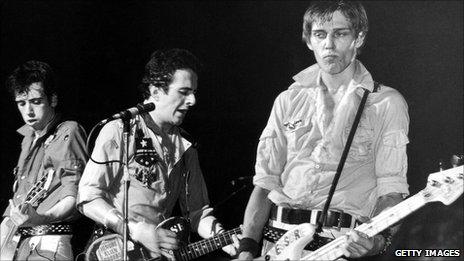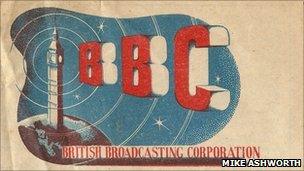Smashed Hits: Is London Calling the best anthem for a city?
- Published
- comments

A version of The Clash song London Calling was used as part of the countdown coverage to the 2012 Olympics. But is it the best advert for the city, asks Alan Connor.
Food shortages, floods and "zombies of death" - welcome to London. The Clash's breakthrough single is enough to start a housing crash and send tourists fleeing.
Even so, it's easy to understand the branding appeal. As it starts, we hear a bass line reveille before Joe Strummer yowls the title, like a radio transmission demanding the listener's attention.
Of course, this is deliberate. The phrase "London Calling" was previously associated with wartime BBC broadcasts to occupied countries - "The news from Britain - up-to-the-minute, truthful".
The Clash were supporters of pirate radio and considered launching their own station - this love song to the wireless signal recounts what, in punk terms, is up-to-the-minute and truthful news. But it isn't saying "come and enjoy the canoe slalom".
In Joe Strummer's mind, in fact, conflict is back. The second line is, "Now war is declared, and battle come down". Engines have stopped running and meltdown is expected.
So what's caused this war, perhaps a Third World War?
It's partly down to resources - a kind of unnatural disaster. The Clash were part-band, part-reading list, and the lyrics distill the gloomiest headlines of the 1970s.
The United Nations was tackling food shortages - as the chorus has it, "the wheat's growing thin". The Three Mile Island reactor leaked radioactive steam ("a nuclear error"). Newspapers suggested that the inter-glacial period might end sooner rather than later ("the ice age is coming"). At times it's unclear whether the city's getting too hot or too cold ("the sun's zooming in"), but either way the outlook is poor.
And so London Calling is a post-apocalyptic radio message to the survivors, a concept familiar to anyone who's seen a zombie movie or any of the 1970s' abundant disaster fiction (see box, right). There's even, at the end, guitar feedback sending a signal in Morse code - naturally, "SOS".
The other sound-effect-of-sorts makes this a very personal portrait of the city by songwriter Strummer. What sounds like a wolf's howl is revealed by early demos as seagulls - the birds Strummer heard from his home in the World's End estate by the bank of the Thames.
"I live by the river" might now be the boast of a mega-mortgage condo-owner - in 1979 it was a shout from a part of the city ravaged by the Blitz.
On top of all that, the song sent another message when broadcast on the real-life radio to real-world listeners - a punky-reggae rallying call to "come out of the cupboard, you boys and girls". That message starts with a repudiation of the Carnaby Street depiction of London, dismissing "phoney Beatlemania" and insisting that the only thing swinging about the capital in 1979 is a policeman's truncheon.

London Calling had been associated with wartime BBC broadcasts to occupied countries
The song calls time on red-bus, groovy-baby London branding - the type of thing we saw at the closing ceremony of the 2008 Olympics, and the type of scenes that London Calling is nowadays used to soundtrack.
Young listeners are instructed not to relive the past (particularly the 1960s, an implied swipe at the band's rivals the Jam) and don't lose yourself in drugs - the second verse is Strummer's rebuke to those who, he later explained, were "getting down on heroin at the time" rather than engaging with that "battle come down".
And an early draft has another target. In his book on the Clash, Route 19 Revisited, music writer Marcus Gray describes Strummer's irritation at London's crowds of visiting sports fans - happily for the 2012 campaign, the thought didn't make the recorded version.
So why has this excoriation of everything the London Tourist Board stands for ended up a feel-good anthem? The corporate-run world inside Stratford's blue perimeter fence seems unlikely, after all, to resemble the Strummerville campfire at Glastonbury.
One reason may be the band's decision to up their sonic game from more punky beginnings. By their next LP, the Clash's producer was boasting of "more guitars per square inch than anything in the history of Western civilisation". London Calling offers so much to listen to that it's possible to miss most of the words between the opening line and the end of the chorus.
The title phrase also lives on in its BBC, non-seditionary sense and it seems that when headline-writers and copywriters type the word "London", "calling" can follow almost unthinkingly. The song is now often not much more than the audio equivalent - a jingle that says "hey, it's London".
"London Calling is a classic example of a song that has become so familiar that its original meaning has been lost," says Gray. "It's instantly recognisable and superficially the perfect invitation to the capital and the world's premiere sporting event, but it's actually about the end of the world, at least as we know it."
The same has happened to other tracks as they become "golden oldies", but that label doesn't quite fit London Calling. In 2011, you can hardly hear a song featuring nuclear accidents, food crises and civil unrest and dismiss it as dated.